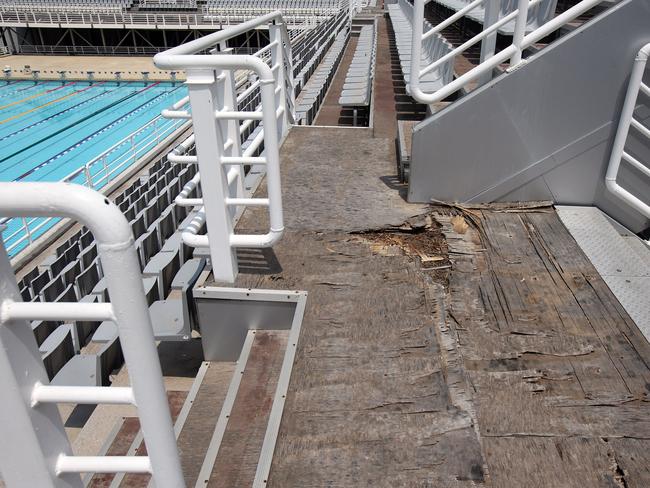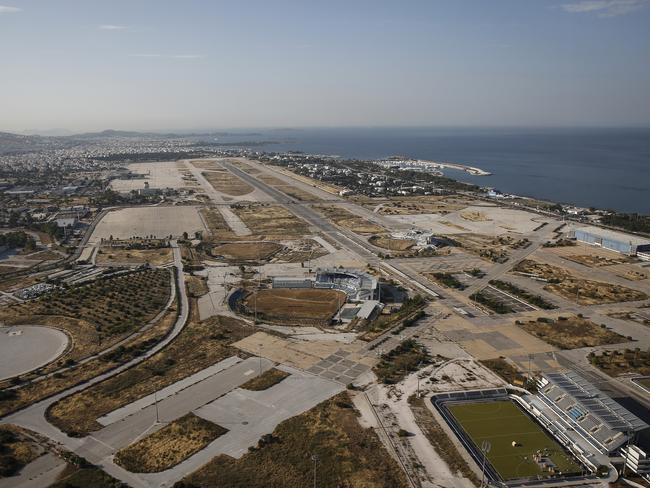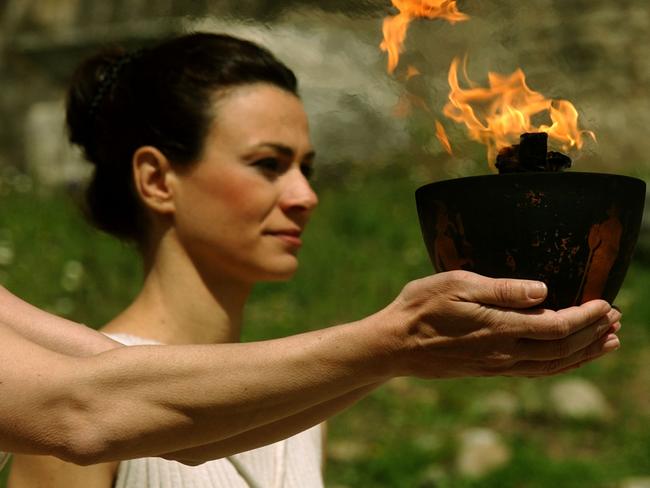A dark Olympic legacy for Greece
IT’S famous for its ancient ruins, but the modern ones are just as striking. They’re abandoned and decaying - the perfect symbol.

AS Greece falls, it isn’t the country’s ancient ruins that provide the starkest symbol of decay.
It’s the state-of-the-art facilities constructed just over ten years ago for the Athens Games, many of which lie abandoned, dirt encrusted on seats and grass sprouting through cracks in the floors.
Olympic Games are vastly expensive undertakings, and almost always mean a crushing financial loss for the host nation. But starry-eyed governments only see enormous international attention and major spending opportunities.
Greece was just another nation that wanted a piece of the pie. But how far did the 2004 Olympics contribute to its current desperate situation?


THE EARLY DOUBTS
Even before the Games, there were questions over Greece’s ability to host. When the nation was selected in 1996, it was a romantic choice: the home of modern Olympics, imbued with traditional values and rich history.
“With all these events, the governing body sets bidders against each other so the winner bids over the odds and makes a loss,” La Trobe University sports economist Liam Lenton told news.com.au. “They get caught up in the excitement. When it turns into rivalry, as with London and Paris for 2012, they both became hellbent on winning for the sake of winning. Several elements can lead us into irrational territory.”
Greece was no different. The nation spent seven years building a brand-new airport, stadiums, a subway system and a tram service, but most of the new structures remained covered in scaffolding just days before the event kicked off. Some joked that the Acropolis was one of the unfinished venues — a line that doesn’t seem as funny any more.
It was one of the tightest races to finish building in Olympic history, but Greece made it. The warning signs were easily dismissed. There are always stories the Olympics organisers won’t be ready, and every time, they magically pull a glittering event out of the bag.
Still, many Greeks remained concerned, staging angry protests and expressing concerns for their businesses away from the buzz. It was too late. The Olympics was back in Athens.

HEAVY COSTS
The Greek finance minister claimed at the time that there had been a “net economic benefit” to the country. It’s hard to quantify. The spending on infrastructure and organisation was declared to be around 8.5 billion euros ($A12.7 billion), but the government claimed that much of the work had a lasting benefit in improving hospitals and archaeological sites and boosting tourism.
But unlike Sydney, which planned for future events at its Olympic Park, there has been no ongoing use of its swimming pools, stadium and boating facilities, with the crumbling monuments a testament to waste.
Mark Stewart, from RMIT University’s School of Economics, Finance and Marketing, told news.com.au: “I co-authored a paper that found no national tourism benefits for Greece. In fact, our stats showed that the Athens Olympics increased tourism in Italy — people looking for Mediterranean sun tried to avoid Greece, went to Italy instead.”
The paper he wrote with Heather Mitchell, What should you pay to host a party? An economic analysis of hosting sports mega-events, found “very little positive effect” on tourism from three football World Cups and five Olympic Games.
What the “mega-events” did achieve was a “feel-good factor”, and governments were able to “harness the hubris” for political gain.
“One take is that bigger countries and cities are in a better position to benefit from tourist inflows, and the capacity to cater for that,” said Dr Lenton. “If this was Paris or New York, the losses would have been far less.
“Many years after the event, there’s a large variation in how successful the legacy is. Sydney did reasonably well although still made a loss, LA made a rare profit in 1984 and in Montreal in 1976, the taxpayer footed the bill for massive losses.”
The Canadians spent $A1.7 billion — a huge amount in the seventies. Provincial taxpayers didn’t pay it off until 2006, 30 years later.
“The Olympics wouldn’t have bankrupted Greece, but they certainly didn’t help,” said Dr Lenton.

IS THE IOC RESPONSIBLE?
The International Olympics Committee made a cool $A1.3 billion from the Games, and Peter Berlin argues in Politico that it therefore owes Greece, and could have stepped in to help prevent the nation’s slide into $349 billion debt.
Beijing and London were able to absorb the gigantic cost of the most recent Olympic Games, but there are already grave fears being raised in Rio over Brazil’s ability to host next year’s event so soon after the World Cup.
They may indeed have some facilities now in place, but not enough in the host city of Rio, which the BBC says is making the ‘worst ever’ preparations for an Olympic Games. The event will mean extra spending in a country where many children live in slums and the prison system cannot hold its criminals.
You would hope that the IOC would consider whether awarding the Games to a certain country is an irresponsible choice, but it doesn’t appear to think about that enough.
“For a similar reason you can argue it’s not the responsibility of a company that produces toxic waste to save the environment, it’s not necessarily beholden on the committee to only award the Games to a country with a financial plan,” said Dr Lenton.
“They want the best event, so it goes to whoever promises the most. Generally if you spend more, you can promise more.”

A SURPRISING SOLUTION
The answer for Greece could be the exact opposite of what seems most wise. Berlin suggests in Politico that the IOC holds the Olympics permanently in the birthplace of the ancient Games.
It would allow the country to make use of its stadiums and keep the event’s costs down by not constantly moving it around.
Dr Stewart and Dr Mitchell suggest another option: “The best way to reduce the politics associated with bidding for mega-events is to allocate them via an auction, rather than the wasteful rent-seeking methods that are currently used.”
Greece’s Olympic Village is the largest emblem of the desolation left by the Games. It was to be turned into the country’s biggest social housing development, but there was controversy from the start over the delays, overspending and environmentally questionable building methods.
Now many of the homes are neglected, RFI reports, and shops, offices and the local hospital have slowly closed. “The reason that Greece is currently in this shape is rooted in the fact that we organised the Olympic Games,” said one of the 8000 residents.
The village sums up Greece’s problems. The government went on a spending spree with eurozone funds during the Games and painted a positive picture of the situation. It didn’t worry too much about its weak economy handling the debt, look ahead realistically or rein in its spending on credit.
Now Europe’s ancient village is in an Olympic-sized hole.
Meanwhile, a secret IMF report into Greece’s debt sustainability has revealed the nation needs far more relief than has been contemplated, Reuters reported overnight.
The leaked analysis said European countries would have to give the nation a 30-year grace period on all its loans, and a dramatic maturity extension, if they do not agree to deep “haircuts” of existing debt or ongoing fiscal support.



